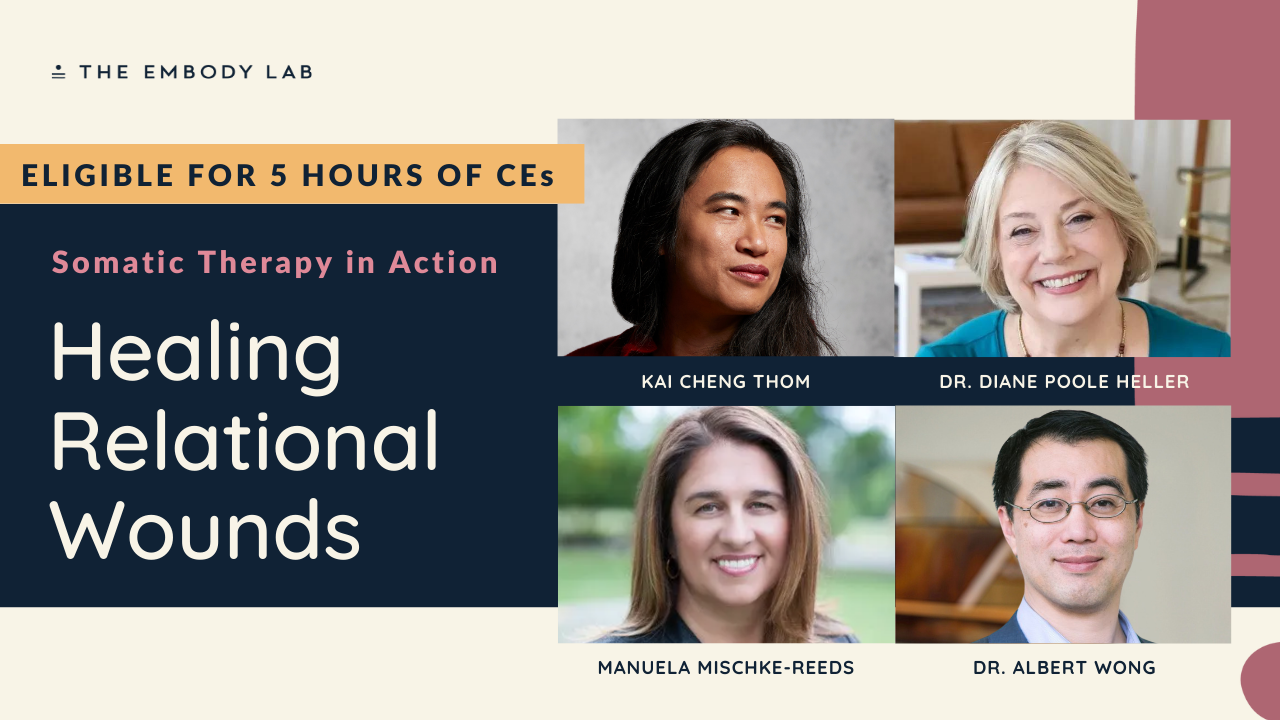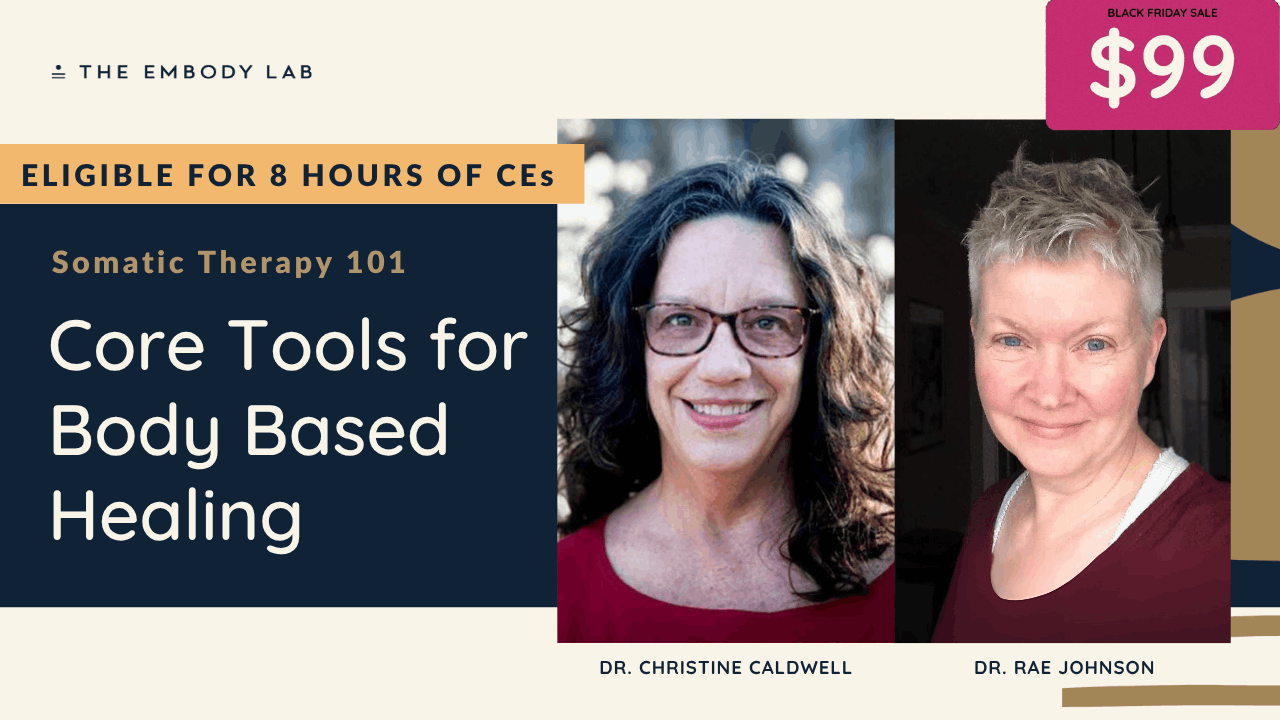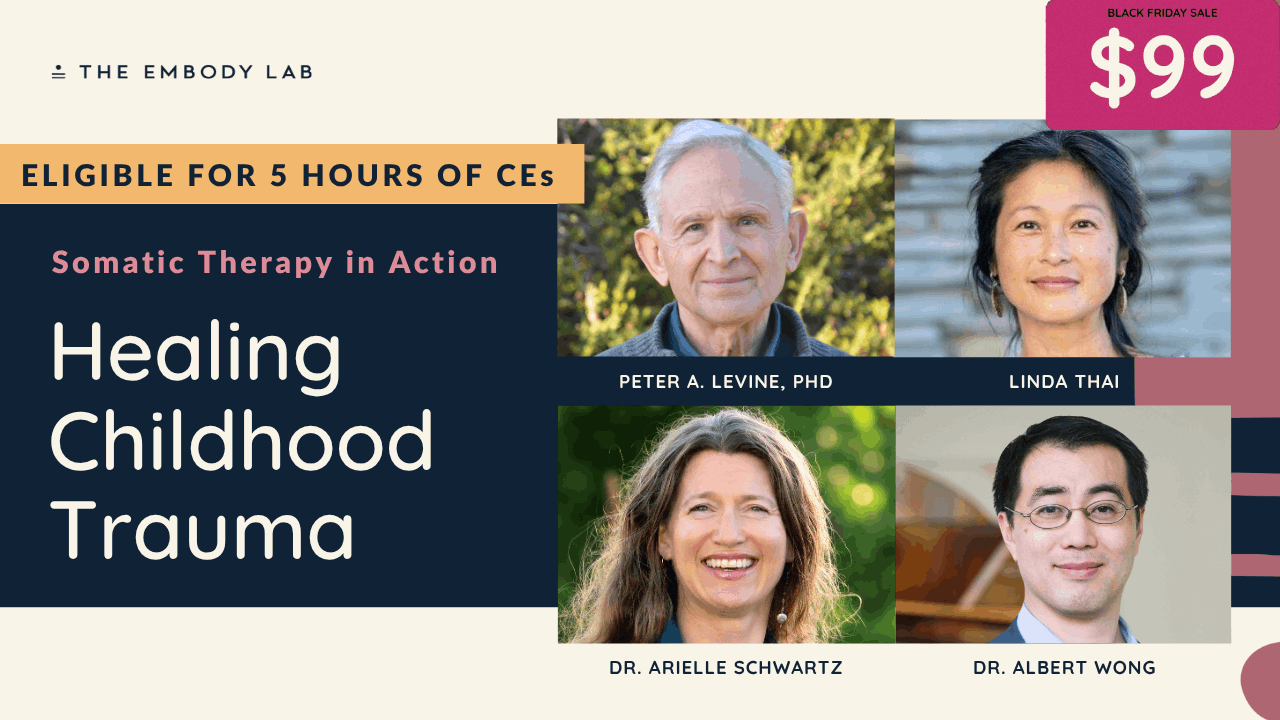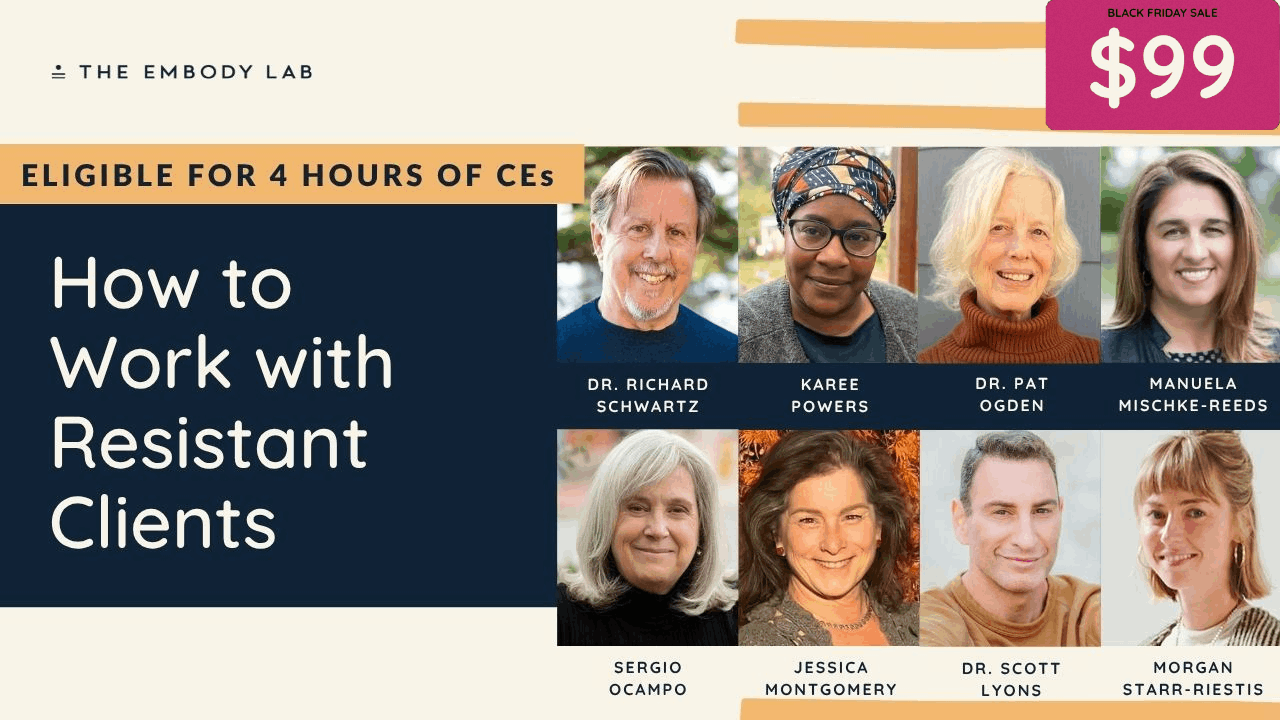
Somatic Therapy in Action: Healing Relational Wounds
$447 USD $247
On-Demand Course Length: 5 Hours
This course showcases four somatic demonstrations focused on relationship dynamics. Witness participant s explore challenges like career and family, mother-daughter bonds, the desire for connection, and the complexities of motherhood through mindful dialogue and somatic awareness. Observe how therapists utilize techniques like grounding and imagery to help participant s process emotions, release tension, and cultivate self-acceptance and agency. This package illuminates the profound connection between the body and relational experiences, offering valuable insights into healing and fostering deeper connections.
ADD TO CARTAbout this course
Healing Through Relationship: Somatic Demonstrations in Relational Dynamics
Our most profound wounds—and our deepest healing—happen in relationship. The way we relate to partners, parents, children, and ourselves is written not just in our minds but in our bodies: in the tension we hold, the breath we restrict, the ways we reach out or pull back. This powerful four-module demonstration package showcases somatic therapy's capacity to transform relational patterns through body-based awareness and processing.
The Body-Relationship Connection:
Witness how skilled practitioners guide clients through challenges in career and family dynamics, mother-daughter bonds, the longing for authentic connection, and the complexities of motherhood. Through mindful dialogue and somatic awareness, you'll observe how therapists utilize techniques like grounding, imagery, and pendulation to help clients process emotions, release held tension, and cultivate self-acceptance and agency. These demonstrations illuminate the profound connection between the body and relational experiences, offering invaluable insights into healing and fostering deeper connections.
What You'll Learn:
Through four intimate demonstration modules, you'll discover how to:
Module 1: Exploring Stuckness and Emotional Release in Career and Family Dynamics with Dr. Diane Poole Heller
Somatic Techniques for Regulation:
- Focus on bodily sensations like temperature changes and areas of support
- Facilitate nervous system regulation through body awareness
- Process trauma-related activation through somatic channels
- Track how the body moves through stuckness to release
Internal and External Resourcing:
- Identify internal resources (feeling of support in lower back)
- Utilize external resources (mental presence of supportive partner)
- Foster co-regulation to aid resolution of stuckness
- Support discharge of held energy through body-based interventions
Tracking Nervous System States:
- Recognize shifts in bodily sensations (cold extremities to radiating warmth)
- Understand emergence of imagery and emotions connected to past experiences
- Identify indicators of nervous system movement through different states
- Work with freeze responses and subsequent release of held arousal
- Support release through laughter, tears, and heat dissipation
- Understand impact of early attachment patterns on current experiences
Module 2: Addressing Mother-Daughter Challenges and Fostering Grounding with Kai Cheng Thom
Creating Safety and Rapport:
- Acknowledge the environment and establish container
- Invite participant agreements for the space
- State intentions for non-judgmental and confidential work
- Build foundation for vulnerable exploration
Somatic Inquiry for Relational Issues:
- Attend to bodily sensations ("something in my mid body and darting eyes")
- Track shakiness, heavy arms, and other somatic expressions
- Explore participant's experience of challenging mother relationship
- Connect body sensations to underlying emotions
Parts Work Through Embodiment:
- Invite participants to step into different "parts" (the "putting it down" part and "want to care" part)
- Verbalize feelings and messages associated with each part
- Amplify expressions to deepen awareness
- Process difficult emotions including anger, sadness, and fear
- Use grounding, imagery, and pendulation for emotional regulation
- Foster self-acceptance and agency
Module 3: Navigating Grief and Anxiety in Interpersonal Relationships with Dr. Albert Wong
Somatic Inquiry for Connection:
- Guide noticing and articulation of bodily sensations
- Track expanding and contracting in the heart area
- Connect sensations with emotional experiences and relational patterns
- Explore longing for closeness alongside fear of connection
Permission and Expression:
- Offer permission to feel and express difficult emotions
- Acknowledge needs (like the need to hide)
- Facilitate expression of anger (as fire in the chest)
- Support processing and transformation of experiences
- Use gentle pacing and attuned presence
- Employ reflective questioning to support safety
- Guide release through imagery and movement
- Foster self-acceptance and groundedness
Module 4: Processing Motherhood Grief and Overwhelm with Manuela Mischke-Reeds
Mindfulness and Somatic Grounding:
- Initiate sessions with guided body scan
- Use humming and other grounding exercises
- Cultivate presence for both participant and witnessing group
- Emphasize the body as primary teacher
Attuned Listening and Tracking:
- Observe verbal and nonverbal cues
- Track shifts in body sensations, breath, and imagery (black straps, concrete block)
- Follow the unfolding process
- Identify emerging themes (control, unknown, push-pull dynamics)
Empowering Self-Awareness:
- Invite exploration of meaning in somatic experiences
- Suggest gentle movements and sounds to support release
- Reflect emerging patterns to deepen understanding
- Support participant's own process and agency
- Work with grief, anxiety, and overwhelm related to motherhood and infertility
- Facilitate deeper connection in relationships
- Use somatic interventions for emotional regulation
Core Competencies Developed Across All Modules:
Somatic Tracking in Relational Work:
- Notice how relational patterns live in the body
- Track temperature changes, muscle tension, breath patterns
- Recognize bodily indicators of nervous system states
- Connect physical sensations to relational dynamics
Working with Relational Wounds:
- Address attachment patterns and their somatic imprints
- Navigate parent-child dynamics through body awareness
- Work with grief, anxiety, and longing in relationships
- Support processing of difficult emotions (anger, sadness, fear)
Therapeutic Techniques:
- Establish safety through grounding and mindfulness
- Use imagery and movement for emotional release
- Apply pendulation between activation and regulation
- Facilitate parts work through embodied exploration
- Offer permission for authentic expression
- Employ gentle pacing and attuned presence
Co-Regulation and Resourcing:
- Utilize internal and external resources
- Foster co-regulation in the therapeutic relationship
- Support self-regulation capacity
- Build agency and self-acceptance
Release and Integration:
- Facilitate discharge of held energy and tension
- Support completion of incomplete relational responses
- Guide movement from stuckness to flow
- Foster integration through body-based processing
Expert Faculty:
Learn from Dr. Diane Poole Heller (attachment specialist), Kai Cheng Thom, Dr. Albert Wong, and Manuela Mischke-Reeds—each demonstrating unique approaches to healing relational wounds through somatic awareness.
The Demonstration Advantage:
Watching real sessions with actual relational struggles reveals the nuanced art of somatic therapy. You'll witness how skilled practitioners:
- Create safety for vulnerable relational material
- Track subtle shifts in nervous system states
- Know when to slow down and when to explore
- Use language that regulates rather than activates
- Support authentic expression and release
- Navigate the dance between connection and protection
Transformation Through Embodied Relating:
This package supports professionals in helping clients:
- Recognize how relationship patterns are held in the body
- Process relational wounds through somatic channels
- Release tension from unresolved relational dynamics
- Access self-acceptance beneath protective patterns
- Cultivate agency in relationships
- Experience corrective relational experiences in therapy
- Build capacity for deeper, more authentic connection
Who This Is For:
Essential training for therapists, coaches, and healing professionals working with:
- Attachment wounds and family-of-origin patterns
- Mother-daughter or parent-child dynamics
- Couple's work and relationship struggles
- Grief and loss in relationships
- Anxiety about connection and intimacy
- The complexities of parenthood and family systems
These demonstrations illuminate how our bodies hold the story of every significant relationship—and how, through somatic awareness and skilled facilitation, we can rewrite those stories from the inside out.
Join our brilliant experts for the following sessions:
DR. ALBERT WONG
Dr. Albert Wong is the Director of the Trauma Certificate Program at Somatopia and a leading educator and clinician in the field of somatics. He was residential staff at the Esalen Institute for five years and served as the Director of Somatic Psychology at John F. Kennedy University. A Marshall Scholar, he has been featured on PBS, in Time Magazine, and in the book The American Soul Rush. He was educated at Princeton, Oxford, and the University of Tennessee and is the recipient of numerous national awards (Westinghouse Science Talent Scholarship, Goldwater Scholarship). He maintains a private counseling and consulting practice centered around somatic psychotherapy and is the founder of the online somatic education platform, Somatopia: www.somatopia.com. He is the author of the recently released book, The Healing Trauma Workbook.
Website: www.somatopia.com
Facebook: www.facebook.com/somatopia
Instagram: @somatopia
Youtube: www.youtube.com/somatopia
DR. DIANE POOLE HELLER
Diane Poole Heller PhD is an internationally recognized speaker, author and expert in the field of attachment theory and trauma resolution. Her signature approach—DARe (Dynamic Attachment Re-patterning experience)—provides therapists and individuals with relevant skills and practical exercises that facilitate healing from attachment and trauma wounds. Diane’s training programs, books, lectures and work as a therapist have helped a countless number of people in their healing journey towards experiencing greater intimacy, wholeness and more fulfilling relationships. As Senior Faculty for SETI, Diane studied with Dr. Peter Levine and taught Somatic Experiencing® trauma work internationally for over 25 years. She is also the author of three books: The Power of Attachment: How to Create Deep and Lasting Intimate Relationships, a practical guide to restoring and reconnecting with our innate secure attachment as adults; Crash Course, on accident trauma; and the audio book, Healing Your Attachment Wounds: How to Create Deep and Lasting Relationships. Her film, Surviving Columbine, aired on CNN and supported community healing after the Columbine High School shootings.
Website: www.dianepooleheller.com
KAI CHENG THOM
Kai Cheng Thom, MSW, MSc, Qualified Mediator, Certified Professional Jungian Life Coach, and Certified Somatic Sex Educator, is a coach, process facilitator, and mediator whose work focuses on the intersections of trauma healing, Transformative Justice, and social change. A noted theorist and practitioner in the field of conflict resolution, Kai Cheng has made significant contributions towards the integration and application of conflict transformation, crisis intervention, and body-based trauma healing methods in an activist context through her writing and teaching. Kai Cheng maintains a private practice as a one-on-one somatic coach, consultant, and group facilitator, drawing from extensive professional trainings in a wide variety of healing and wellness disciplines. She has also trained hundreds of embodiment and wellness professionals as Adjunct Faculty with the Institute for the Study of Somatic Sex Education and a Senior Teacher at The Embody Lab.
Books: www.kaichengthom.com/books/
Instagram: @kaichengthom
Twitter: @razorfemme
MANUELA MISCHKE-REEDS
Manuela Mischke-Reeds. MFT is an international teacher of somatic psychology, somatic psychotherapist, a founder of Hakomi Institute of California and Embodywise (non-profit) that cultivates learning from the the wisdom teachings of the body. She is the developer of the Innate Somatic Intelligence Trauma Therapy Approach (ISITTA), an in-depth trauma training program for therapists and practitioners.
Manuela has 25+ years of clinical experience with trauma clients, coaching executives, first responders. She lectures and trains professionals on the topics of Hakomi Therapy, mindfulness-somatic psychology, trauma healing, embodied mindfulness for trauma and stress, Movement Therapy, Somatic Psychedelic assisted Psychotherapy.
Manuela is the author of several books, including 125 Somatic Psychotherapy Tools for Trauma and Stress (PESI 2018), 8 Keys to Practicing Mindfulness: Practical Strategies for Emotional Health and Well Being (W.W.Norton 2015).
Website: www.Embodywise.com
Instagram: @embodywise
DR. SCOTT LYONS
Dr. Scott Lyons is a licensed holistic psychologist, educator and author of the book Addicted to Drama: Healing Dependency on Crisis and Chaos in Yourself and Others, with Hachette publishing. Scott is also the host of The Gently Used Human Podcast, a delightfully depthful and often hilarious exploration of what it is to be human, to have lived life, and come out gently used.
As a renowned body-based trauma expert, Doctor of Osteopathy (Spain) and Mind-Body Medicine specialist, Scott helps people to break free from cycles of pain, limited beliefs, and trauma. Scott is an innovator in transformative wellness and trauma therapy, teaching over half a million people internationally over the past twenty years how to relieve stress and restore vitality. Scott has worked with many of the country’s top leaders and CEOs as an executive coach and wellness consultant.
Scott is the creator of The Embody Lab—the largest online learning platform for body-based trauma therapies—and developer of Somatic Stress Release™, a holistic process of restoring biological resilience, taught in over 20 countries.
Scott is a Certified Body-Mind Centering™ Teacher and Practitioner, Cranio-Sacral Therapist, Visceral Manipulation Therapist, Neuro-Developmental Therapist, Infant Developmental Movement Educator, Registered Movement Therapist and Educator, Trauma Therapist, Somatic Experiencing Practitioner, Thai Massage Practitioner, Clinical Hypnotherapist, Mindfulness-based Executive Coach, Experiential Anatomy/ Developmental Movement and Yoga Practitioner, and a 500-hour registered yoga teacher. Additionally Scott holds a BFA in Theater/Psychology, MFA in Dance/Choreography, MS in Clinical Psychology, and a PhD in Clinical Psychology and Mind-Body Medicine.
Scott has been featured in The New York Times, Vanity Fair, Forbes Women, Fast Company, The Telegraph, The Guardian, INC., CNBC Make It, Fortune, Bustle, Reader’s Digest and Goop. He has also appeared on The Mel Robbins Podcast, The Jordan Harbinger Show, The We Can Do Hard Things Podcast, The Mental Illness Happy Hour, The Human Upgrade, The Genius Life, and The Chopra Well.
Websites: www.TheEmbodyLab.com, www.drscottlyons.com
Instagram: @DrscottLyons

Guided full-length demonstrations
Observe four full-length somatic therapy sessions with clients. Each demonstration has a detailed breakdown and guided reflections of the session.

Powerful tools for your practice
In each session, the facilitator will walk you through what they did, why they did it, and how to adapt the same tools to your own practice.

Learn on your schedule
Get lifetime access to all your sessions. Download videos, audio files, and complete transcripts. Learn anywhere, anytime, on your schedule.
Learn more about this course.
What Customers Are Saying
Sam L.
"Deeply insightful course! The relational focus and practical techniques have greatly enriched my practice and client interactions."
Avery T.
"A powerful exploration of somatic healing that beautifully addresses complex relational dynamics with compassion and clarity."
Jordan P.
"Exceptional demonstrations—this course profoundly enhanced my skills in supporting clients toward deeper relational healing."
Other Courses

Somatic Therapy 101 - Core Tools for Body Based Healing
$497 $99
Unlock the transformative power of embodied awareness in this foundational course. Gain essential somatic skills including sensory awareness, nonverbal communication, and movement impulses. Experience practical techniques such as kinesthetic empathy, tracking movements, and oscillating attention. Learn to authentically integrate somatic practices into your professional and personal growth.

Somatic Therapy in Action: Healing Childhood Trauma
$447 $99
Explore powerful somatic therapy techniques addressing childhood trauma, revealing pathways to healing and resilience. Discover shape and countershape, psychodrama methods, and somatic emotional analysis within safe therapeutic environments. Gain practical tools to gently process trauma, release tension, and empower clients.

How to Work with Resistant Clients
$447 $99
Redefine resistance as wisdom. This course offers practical somatic and relational tools to meet client resistance with curiosity, compassion, and collaboration transforming stuckness into insight and forward movement.
List your practice on The Embody Lab’s Somatic Therapist & Practitioner Directory!
More somatic therapy seekers come to The Embody Lab in their search for the right therapist than to any other somatic therapy site. We’ll help your practice be seen by hundreds of thousands of potential clients seeking your services.
Join The Directory Here

